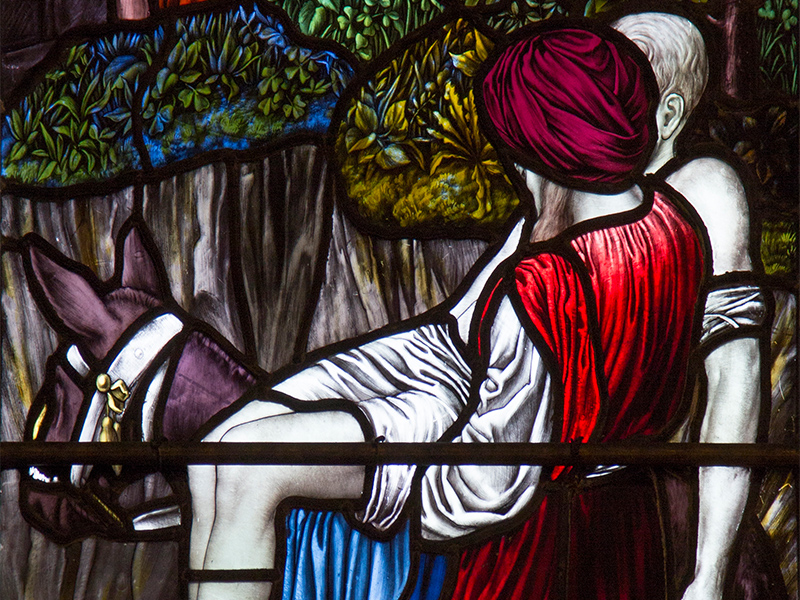
Merciful Love
Fifteenth Sunday of Ordinary Time (C) | Fr Martin Ganeri ponders the meaning of mercy, and looks to Jesus as the exemplar cause of genuine acts of mercy
Luke’s account of the giving of the great double commandment to love God and to love neighbour leads on to the parable of the Good Samaritan. The parable of the Good Samaritan answers the question, which the lawyer poses: ‘Who is my neighbour?’ And the answer that is given is that our neighbour is anyone to whom we should and do show mercy. When Christ asks the lawyer which of the three, who encountered the man who was beaten and robbed, is his neighbour, he correctly replies: ‘The one who showed mercy on him.’
In the Latin language of the Catholic Church the term that is used for mercy is misericordia. In the Latin translation of the Bible this is the term that is used in places where either the Hebrew or Greek scriptures talk of the loving kindness, or the mercy and pity, of God for humanity – that inexhaustible love of God that comes to be the hallmark of human experience of God as the life of God’s people unfolds in the course of salvation history. And it is misericordia that the Latin text has in its version of the parable of the Good Samaritan.
The word, misericordia, is often just translated as ‘mercy,’ but a better way of expressing the relationship it conveys would be the richer phrase of ‘merciful love.’ The merciful love of God for humanity and hence the merciful love that men and women should have for each other in imitation of their God.
St Thomas Aquinas, says of misericordia, of ‘merciful love,’ that:
A person is said to have merciful love when he has sorrow in his heart, being affected by sorrow at the misery of another, as though it were his own. Hence it follows that he endeavours to dispel the misery of the other person, as if it were his own, and this is the effect of merciful love (Summa Theologiae 1.21.3)
Merciful love is then a twofold action. On the one hand, it is to be ‘affected by sorrow at the misery of another, as though it were his own.’ On the other hand, it does not does not just stop at the feeling of sorrow or pity for another. Rather, it moves on to ‘dispel the misery of the other.’ Merciful love is a powerful force that acts to relieve the misfortunes of others, to dispel the things that compromise their welfare, and to bring about their full flourishing as human beings.
The parable of the Good Samaritan identifies the neighbour as the one to whom we should and can show this merciful love through this twofold action. In all probability the priest and the Levite had compassion on the man in the first sense of feeling sorrow at his sufferings, but it is only the Samaritan who moves on to undertake to alleviate his sufferings and to free him from them.
Now, in the traditional interpretation of the Parable of the Good Samaritan – the Good Samaritan becomes a figure of Christ. And in Christ we see the supreme example of what love of God and love of Neighbour mean. Above all in his Passion, Christ feels all the suffering of humanity as his own, but also works to free us from that suffering and bring us to the fullness of life. Christ embraces our humanity with his divinity. He embraces the hatred and violence that are so much a part of the way human beings treat each other, with his love and self-sacrifice. He embraces death with his life. And in that act of compassion overcomes violence and hated and death, by means of self-sacrifice, love and life.
So, a richer answer to the Lawyer’s question is that our neighbour is the one to whom we should and can show the same merciful love that God shows to all of humanity in Christ. Christ is both the exemplar and the cause of the merciful love that we should show ourselves. Our own experience of God’s merciful love for us through the presence of the Spirit of Christ within us is what should then radiate out to our fellow human beings. We become Good Samaritans when our lives become conformed to that of Christ so fully that we do become the instruments of Christ’s own mercy in the world.
Readings: Deut 30:10-14 | Col 1:15-20 | Luke 10:25-37
Photograph by Fr Lawrence Lew OP of a window in St Salvators chapel, St Andrew’s University.


